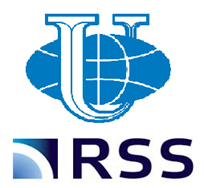RUDN and RSS presented project Territory in Switzerland
 The event was held from May 20 to 24 in Geneva. In order to demonstrate the advanced developments of the holding in the field of information technology and create fundamentally new objects of intellectual activity, as well as to promote the Russian initiative on digital transformation of the field of intellectual property, the RCC together with RUDN presented the report “Neural network technologies for processing satellite imagery as objects of legal protection. Project "Territory" (Unique identifier of works RFMEFI57517X0167). The Territory project is being created on behalf of the Ministry of Education and Science of the Russian Federation as part of the federal target program Research and Development in Priority Areas for the Development of the Scientific and Technological Complex of Russia for 2014-2020. The created service with the help of automated remote sensing data processing will help to determine the presence of buildings and structures, quarries, changes in the forest fund in any given territory. The Territory service is the result of scientific research using artificial intelligence methods and modern machine learning algorithms based on neural networks. It will become the basis for creating new products, including in the market of geoinformation support of intellectual property management.
The event was held from May 20 to 24 in Geneva. In order to demonstrate the advanced developments of the holding in the field of information technology and create fundamentally new objects of intellectual activity, as well as to promote the Russian initiative on digital transformation of the field of intellectual property, the RCC together with RUDN presented the report “Neural network technologies for processing satellite imagery as objects of legal protection. Project "Territory" (Unique identifier of works RFMEFI57517X0167). The Territory project is being created on behalf of the Ministry of Education and Science of the Russian Federation as part of the federal target program Research and Development in Priority Areas for the Development of the Scientific and Technological Complex of Russia for 2014-2020. The created service with the help of automated remote sensing data processing will help to determine the presence of buildings and structures, quarries, changes in the forest fund in any given territory. The Territory service is the result of scientific research using artificial intelligence methods and modern machine learning algorithms based on neural networks. It will become the basis for creating new products, including in the market of geoinformation support of intellectual property management.
References:
RUDN University and Russian Space Systems has cooperation activities since 2014.
In 2017 RUDN developed program for innovation development of the RSS until the 2025
Matilda Pavlovna Mityaeva was born in 1925. In November 1942, she volunteered for frontline duty. She participated in the Great Patriotic War from November 1942 to June 1945 as part of the 53rd Infantry Division of the 475th Infantry Regiment. She was wounded twice.
The team led by Sergey Zyryanov, Head of the Department of General and Clinical Pharmacology, became the winner of the All-Russian competition of scientific projects "Technologies for Human Health".
RUDN University constantly adapts to the changes of the modern world and responds to challenges flexibly. This allows us to keep the standard of a world-class research university. The sphere of science is no exception. Peter Dokukin, Head of the Research Division, presented the updated R&D Programme at the meeting of the RUDN University Academic Council.
Matilda Pavlovna Mityaeva was born in 1925. In November 1942, she volunteered for frontline duty. She participated in the Great Patriotic War from November 1942 to June 1945 as part of the 53rd Infantry Division of the 475th Infantry Regiment. She was wounded twice.
The team led by Sergey Zyryanov, Head of the Department of General and Clinical Pharmacology, became the winner of the All-Russian competition of scientific projects "Technologies for Human Health".
RUDN University constantly adapts to the changes of the modern world and responds to challenges flexibly. This allows us to keep the standard of a world-class research university. The sphere of science is no exception. Peter Dokukin, Head of the Research Division, presented the updated R&D Programme at the meeting of the RUDN University Academic Council.